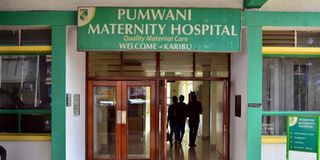Pumwani child birth saga reveals sorry state of maternity hospitals

The main entrance to Pumwani Maternity Hospital.
What you need to know:
- Shockingly, the Nairobi Metropolitan Services went on the defensive, saying the incident took place when nurses were on a go-slow.
- According to records, Pumwani delivers as many as 150 babies a day
Its name should elicit lovely images of proud mothers, bouncing babies and joyful families. And for some years, Pumwani Maternity Hospital in Nairobi delivered excellent services. Birth was its byword. Then, somewhere along the way, things changed.
Neglected by the city fathers over the years, the once-famous hospital is now a pain for mothers. Hardly a week passes without a bad incident. At the weekend, a video clip of a woman in labour lying on the tarmac outside the hospital caused outrage.
She had been turned away by guards from the only place she knew her baby would be safe. But she trusted her maternal instincts and successfully delivered with the help of a Good Samaritan.
Shockingly, the Nairobi Metropolitan Services went on the defensive, saying the incident took place when nurses were on a go-slow.
“The security guard denied the patient access to the premises in an unfortunate incident. We take this opportunity to apologise to all Kenyans and mothers in particular for this unfortunate incident,” said NMS Director of Medical Services Josephine Kibaru-Mbae, in a letter posted on Twitter.
Essential services
She insisted that essential services were running, yet the woman in labour was barred from accessing the facility. Delivery, certainly, was not among the ‘essential services’. Women leaders reacted with fury and demanded an investigation to stop a recurrence.
Homa Bay Woman Rep Gladys Wanga dismissed Dr Kibaru-Mbae’s statement, saying, the guards could not have acted without instructions from the management.
The incident reflects the sorry state of maternity hospitals in the country, especially in underprivileged communities. A study on respectful maternity care from the Kenya Medical Research Institute shows that women in labour — especially those in poor and rural areas — are more likely to be neglected, humiliated, and often subjected to verbal and, at times, physical abuse.
In a 2014 report on disparities in key maternal and new-born health interventions, Unicef noted that 91 per cent of wealthy women in labour would be attended to, while only 31 per cent of the poor would be lucky to be handled by skilled healthcare workers.
Personal protective equipment
Last month, the NMS health department dismissed concerns from nurses at Pumwani and told them “to go to the media where they run to often”. The nurses had sought audience with their seniors over unpaid dues, insurance cover and lack of personal protective equipment.
In papers seen by the Nation, the hospital gave temporary nurses Sh300-an-hour contracts signed by an administrative officer, Hilda Obewa, in April. This would amount to about Sh48,000 a month for graduate nurses, with no insurance, house or transport allowances.
Three months later, the nurses were replaced without a cent.
To further complicate matters, NMS dismissed the contracts of the more than 60 nurses. It also cited lack of finances, yet Health CS Mutahi Kagwe had just announced the county had partnered with the Ministry of Health to build 16 hospitals at Sh70 million each.
According to records, Pumwani delivers as many as 150 babies a day. The facility, however, declined to share the number of doctors, clinical officers and nurses on its payroll.
On June 23, Dr J.W. Muriithi from the Department of Psychology at the University of Nairobi published a paper in the Asian Journal of Research in Nursing and Health that nine in 10 (89 per cent) of nurses in Pumwani suffer from burnout.
The paper noted that the burnouts came from “workload, extended shifts, role conflict and ambiguity”.
The World Health Organisation recommends a nurses’ ratio of one per 400 patients but in county public health system in which Pumwani functions, the nurses ratio is as low as 1: 12,500, according to the Kenya Health Workforce Survey Report. That is one nurse on duties meant for 30.
Insecurity in the area has also been identified as a source of anxiety. Nairobi Woman Rep Esther Passaris told NTV in an interview that crime kept nurses from helping the expectant mother. While this was scoffed at, nurses in Pumwani have reported attacks such as mugging, being stabbed and robbed on their way to and from work. The hospital neighbours Majengo, a sprawling slum in the densely populated Pumwani area, where insecurity thrives.





